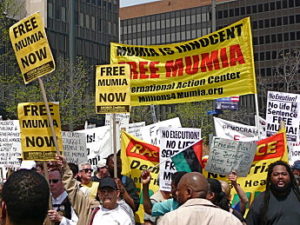
Recently the Supreme Court of Pennsylvania again underscored its willingness to impede justice in the contentious case of imprisoned journalist Mumia Abu-Jamal through issuance of an unusual decision that utilized a rarely employed power of that court.
Pennsylvania’s highest court used its King’s Bench authority to order an investigation into conflict of interest charges against the District Attorney’s Office in Philadelphia leveled by avowed enemies of Abu-Jamal.
Those opponents, in their request to the Pa Supreme Court, included a claim that Philadelphia’s DA Office was not aggressive enough in its opposition to appeals filed by this inmate convicted in 1982 for murder of a Philadelphia policeman. Those opponents want the Court to remove the DA’s Office from the case.
Many across the United States and around the world view Abu-Jamal as a political prisoner.
One consequence of that uncommon investigation ordered by the Supreme Court is to further delay deliberations on an appeal pending for Abu-Jamal that ironically centers on instances of misconduct against Abu-Jamal by a member of the Pa Supreme Court.
King’s Bench is an extraordinary authority exercised by the highest courts in just a few states. It permits those courts to override the ordinary legal process. Pennsylvania Supreme Court rulings limit King’s Bench to issues of “public importance” that require timely intervention. Experts note the general legal principal that King’s Bench is not appropriate for an individual or group simply displeased with a governmental action.
Last fall the Pennsylvania Supreme Court rejected King’s Bench relief for two inmates who argued the death penalty violated the cruel punishment prohibition in Pennsylvania’s state Constitution. One of those inmates has languished in death row isolation for 25-years. A Pennsylvania Supreme Court commission appointed in 1999 documented flaws and racial bias in Pa’s death penalty, findings similar to those of a 2018 Pa legislative task force.
While Pennsylvania’s highest court did not deem death penalty injustices of public importance it did grant a King’s Bench request based on displeasure against Philadelphia’s DA Office from an individual and a group long engaged in a revenge campaign against Abu-Jamal.
That request for King’s Bench intervention came from the widow of Officer Daniel Faulkner, the murdered policeman in the Abu-Jamal case. The widow’s constant supporter is Philadelphia’s Fraternal Order of Police (FOP), the police union notorious for its persistent backing of brutal and racist officers.
Brutality and wrongdoing by police are issues in the Abu-Jamal case along with prosecutorial misconduct and judicial improprieties…issues rejected by Pennsylvania’s Supreme Court despite startling documentation.
An Amnesty International report on the Abu-Jamal case issued in 2000 criticized FOP influence over Pennsylvania’s highest court.
That AI report noted, “the Court’s own rulings on Abu-Jamal’s appeals have left the unfortunate impression that the state Supreme Court may have been unable to impartially adjudicate this controversial case.”
That Abu-Jamal appeal now delayed by the King’s Bench intervention involved alleged improper participation in Abu-Jamal appeals by a former Philadelphia District Attorney, Ronald Castille, who served as a Pa Supreme Court Justice and Chief Justice.
Castille, as DA, opposed Abu-Jamal’s appeals and later as Supreme Court member voted repeatedly against Abu-Jamal appeals.
Castille rejected Abu-Jamal’s request to recuse himself from appeal deliberations despite specific directive in the state’s Code of Judicial Conduct that “a judge formerly employed by a governmental agency should disqualify himself if his impartiality might reasonably be questioned because of such association.”
In a 1998 Pa Supreme Court ruling that rejected a pivotal Abu-Jamal appeal, Castille refused recusal with specious declarations to deflect that Judicial Conduct Code provision.
Castille declared he signed his name on DA opposition to Abu-Jamal appeals merely as an “administrative requirement” unaware of the contents of the legal documents he signed. Also, Castille claimed he obtained no “knowledge of information” about the Abu-Jamal case as DA.
Yet, years before those 1998 Castille declarations, a top DA Office aide to Castille told a reporter that Castille was deeply involved in all death penalty and high-profile cases…both categories applicable to Abu-Jamal.
Castille noted in that 1998 ruling that his career long support from Philadelphia’s police union – financial and political – would not impact his ability to be impartial.
Astonishingly, Castille’s defense of his entanglement with the FOP imploded all appearance of impartiality when he revealed that four other members of that Court had also received campaign support from the FOP.
Amnesty International voiced strong concern in its 2000 report that this FOP entanglement of Castille and four other members of that seven-member court raised the “probability” that Court Justices who voted to uphold Abu-Jamal’s appeals “would suffer a severe political backlash…jeopardizing their future on the bench.”
In 2016, the U.S. Supreme Court issued a ruling that declared it improper for a prosecutor that sought the death penalty against a defendant to rule against that defendant’s appeal as a judge. That ruling involved Ron Castille in a Philadelphia murder case, tried during Castille’s DA tenure where Castille as Supreme Court member rejected that convict’s appeal.
In 2018, Philadelphia Common Pleas Court Judge Leon Tucker cited that 2016 U.S. Supreme Court ruling against Castille when he granted Abu-Jamal the right to a new appeal hearing.
The Tucker ruling noted, “The claim of bias, prejudice and refusal of former Justice Castille to recuse himself is worthy of consideration as true justice must be completely just without even a hint of partiality, lack of integrity or impropriety.”
That King’s Bench request from the slain officer’s widow criticized the Philadelphia DA Office for its failure to oppose having Tucker involved in further actions in the Abu-Jamal case.
